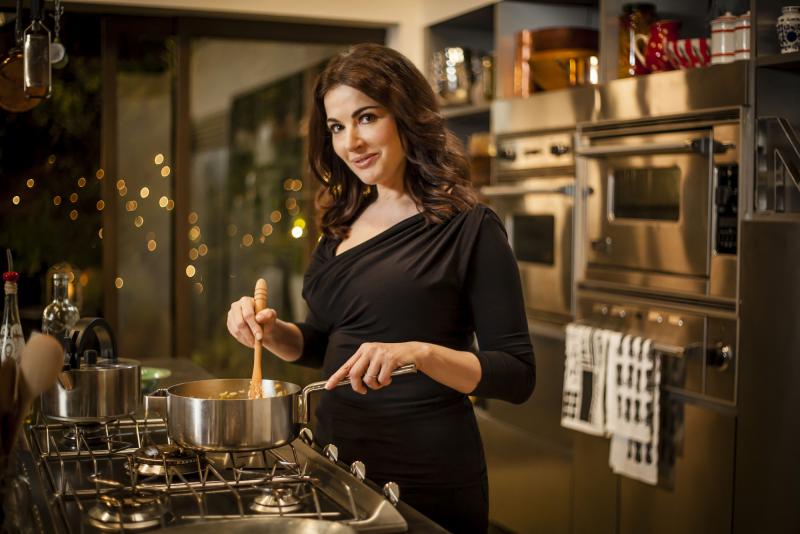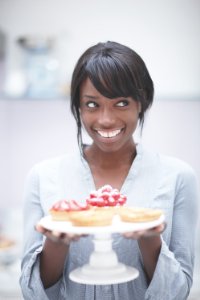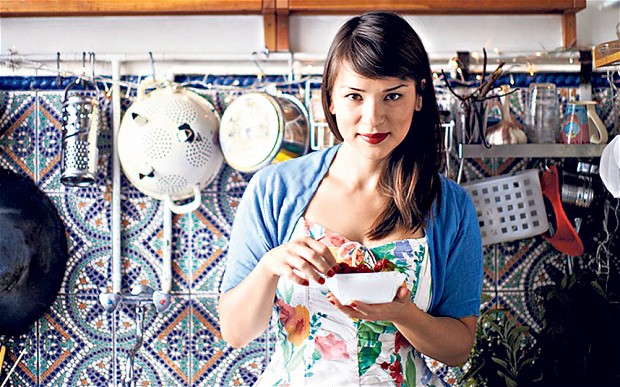Nigellissima, BBC Two | reviews, news & interviews
Nigellissima, BBC Two
Nigellissima, BBC Two
What Nigella Lawson, Rachel Khoo and Lorraine Pascal say about our food and about us

There are two reasons I can often be found slumped on my sofa watching the 8.30pm cookery-show slot on BBC Two on a Monday evening: first, it has the perfect lead-in, University Challenge, after which nothing involving mental exercise is required; and second, I'm a greedy cook. Tonight saw the return to this slot of erotic gastronome Nigella Lawson with Nigellissima, whose cod-Italian title suggested exactly the food she would be cooking.
But it's not so much the food I want to write about. Yes, it looked more desirable than Joseph Gordon-Levitt in Speedos - tagliata, chocolate cheesecake (not very Italian, Nigella conceded), something called a meatza (pizza with a meatball base), an egg poached in chopped tomatoes. But what is really interesting is the contrast between three of this slot's most recent female chefs - Nigella, Lorraine Pascale and Rachel Khoo - and what this means.
Nigella promises no twists, except perhaps in her definition of 'Italian' and indeed of 'food' (meatza, really?)
Take the basic underpinning of these shows: recipes. With Lorraine's modern multiethnic cuisine and Rachel's traditional-ish French, you tend to get measurements, so if you wanted to make the dish, you could take down the details and get to it. Nigella, however, is a little more suggestive (and I don't mean licking her fingers - that's mostly gone): the chocolate cheesecake involves digestive biscuits, cream cheese and Nutella, but the proportions are unclear. This suggests viewer disengagement or that they'll run out to buy the accompanying book or that the recipes are elastic. Whichever way, Nigella's approach to recipes is to cooking what Impressionism is to art, rather than painting by numbers.
(Two of the funnier moments in the show come from Nutella: first, she's not allowed to call it Nutella, so it's just chocolate-hazlenut spread; and second, with wide eyes she seems to think she was the Columbus of chocolate spread, being the first to discover it while working as a chambermaid in Florence. Nutella has, incidentally, been sold around Europe since the Sixties.)
 Then there is the ambition of the food, or its sophistication. Lorraine (pictured right) goes for the lowest common denominator - with a twist. Her dishes - a quick curry, a basic cake, peanut butter squares - are aimed at people who probably never cook, which is why it can be frustrating: if you are a regular watcher of this slot, you are used to something more complex. There is usually a twist, which can be bafflingly banal and is frequently pointless.
Then there is the ambition of the food, or its sophistication. Lorraine (pictured right) goes for the lowest common denominator - with a twist. Her dishes - a quick curry, a basic cake, peanut butter squares - are aimed at people who probably never cook, which is why it can be frustrating: if you are a regular watcher of this slot, you are used to something more complex. There is usually a twist, which can be bafflingly banal and is frequently pointless.
Rachel Khoo is also guilty of The Twist (you won't stop noticing it now), but hers tends to be a thoughtful reinterpretation of a French dish, not always successful but fairly inventive: coq au vin kebabs, an anglicised croque madame, boeuf Bourguignon with baguette dumplings. From her tiny Parisian garret's kitchen, with barely enough room for an oven let alone a camera crew, Rachel creates recipes which are sophisticated, drawing on her Cordon Bleu training. There are real attempts to penetrate the deeper mysteries of French cuisine, making these easily the most ambitious of the three.
Nigella promises no twists, except perhaps in her definition of "Italian" and indeed of "food" (meatza, really?). Her recipes are the most obviously grown-up: her eggs in Purgatory are for when you come in late from a Soho book launch or a private view at Gagosian.
The way she presents them - and indeed her whole show - is the most grown-up too. While Lorraine has a rather demotic approach, and Rachel something of the squee about her, Nigella seduces her audience with her large… vocabulary. You can't imagine Lorraine talking about how to "strew picturesquely" or making "a post-hoc marinade"; capers are the "lip-puckering counterpart" to sultanas. Nigella also seems to share something of herself, and not the "oh-isn't-life-so-busy" shtick Lorraine does: last night she said, "I'd much rather return to the food of my youth than my youth," which is a sad and honest sentiment.
It seems that honesty is what she has plenty of in this show. Instead of the rented friends of yore, we see her actual children from her marriage to John Diamond tucking into tagliata, and she comes out as a geek when we see her picking two cookbooks out of a bookshelf, only for the camera to pull back and reveal an entire wall, high and long, laden with cookbooks - thousands probably. It's an astonishing moment which visually grounds her show in tradition and research.
 (Having said all that about honesty, I can't quite believe that the football-pitch-sized kitchen she cooks in is really hers, though houses in Eaton Square are rather large.)
(Having said all that about honesty, I can't quite believe that the football-pitch-sized kitchen she cooks in is really hers, though houses in Eaton Square are rather large.)
So what does any of this mean? Well, BBC Two are doing a good job at picking a variety of chefs at different levels of sophistication, from the irritating (but with a twist!) to the authoritative, charismatic and enthusing, but they're probably mistaking their audience: given that both Lorraine and Rachel (pictured above) had viewership around 1.7-1.8 million, it's probably the same people who don't want or need the more rudimentary cooks.
I think it also means we're still in a recession: it is cheaper to watch cookery programmes and make those meals than to eat out. It always has been cheaper, of course, but the rate at which we're getting new series suggests we can't have enough of these new dishes to try.
Finally, it seems that our bifurcated society is reflected in our cooks. The swing from Lorraine's lowest common denominator cooking to Nigella and Rachel's ambitious, frankly posh (okay, Nigella is quite posh) recipes, kitchens, locations and even vocabularies is massive. It is good that BBC Two are catering for everyone, but in doing so we see quite how wide the split is.
- Nigellissima is on at 8.30pm on Mondays on BBC Two
Buy
Share this article
Add comment
The future of Arts Journalism
You can stop theartsdesk.com closing!
We urgently need financing to survive. Our fundraising drive has thus far raised £49,000 but we need to reach £100,000 or we will be forced to close. Please contribute here: https://gofund.me/c3f6033d
And if you can forward this information to anyone who might assist, we’d be grateful.

Subscribe to theartsdesk.com
Thank you for continuing to read our work on theartsdesk.com. For unlimited access to every article in its entirety, including our archive of more than 15,000 pieces, we're asking for £5 per month or £40 per year. We feel it's a very good deal, and hope you do too.
To take a subscription now simply click here.
And if you're looking for that extra gift for a friend or family member, why not treat them to a theartsdesk.com gift subscription?
more TV
 Bookish, U&Alibi review - sleuthing and skulduggery in a bomb-battered London
Mark Gatiss's crime drama mixes period atmosphere with crafty clues
Bookish, U&Alibi review - sleuthing and skulduggery in a bomb-battered London
Mark Gatiss's crime drama mixes period atmosphere with crafty clues
 Too Much, Netflix - a romcom that's oversexed, and over here
Lena Dunham's new series presents an England it's often hard to recognise
Too Much, Netflix - a romcom that's oversexed, and over here
Lena Dunham's new series presents an England it's often hard to recognise
 Insomnia, Channel 5 review - a chronicle of deaths foretold
Sarah Pinborough's psychological thriller is cluttered but compelling
Insomnia, Channel 5 review - a chronicle of deaths foretold
Sarah Pinborough's psychological thriller is cluttered but compelling
 Live Aid at 40: When Rock'n'Roll Took on the World, BBC Two review - how Bob Geldof led pop's battle against Ethiopian famine
When wackily-dressed pop stars banded together to give a little help to the helpless
Live Aid at 40: When Rock'n'Roll Took on the World, BBC Two review - how Bob Geldof led pop's battle against Ethiopian famine
When wackily-dressed pop stars banded together to give a little help to the helpless
 Hill, Sky Documentaries review - how Damon Hill battled his demons
Alex Holmes's film is both documentary and psychological portrait
Hill, Sky Documentaries review - how Damon Hill battled his demons
Alex Holmes's film is both documentary and psychological portrait
 Outrageous, U&Drama review - skilfully-executed depiction of the notorious Mitford sisters
A crack cast, clever script and smart direction serve this story well
Outrageous, U&Drama review - skilfully-executed depiction of the notorious Mitford sisters
A crack cast, clever script and smart direction serve this story well
 Prost, BBC 4 review - life and times of the driver they called 'The Professor'
Alain Prost liked being world champion so much he did it four times
Prost, BBC 4 review - life and times of the driver they called 'The Professor'
Alain Prost liked being world champion so much he did it four times
 The Buccaneers, Apple TV+, Season 2 review - American adventuresses run riot in Cornwall
Second helping of frothy Edith Wharton adaptation
The Buccaneers, Apple TV+, Season 2 review - American adventuresses run riot in Cornwall
Second helping of frothy Edith Wharton adaptation
 The Gold, Series 2, BBC One review - back on the trail of the Brink's-Mat bandits
Following the money to the Isle of Man, Spain and the Caribbean
The Gold, Series 2, BBC One review - back on the trail of the Brink's-Mat bandits
Following the money to the Isle of Man, Spain and the Caribbean
 Dept. Q, Netflix review - Danish crime thriller finds a new home in Edinburgh
Matthew Goode stars as antisocial detective Carl Morck
Dept. Q, Netflix review - Danish crime thriller finds a new home in Edinburgh
Matthew Goode stars as antisocial detective Carl Morck
 The Rise and Fall of Michelle Mone, BBC Two - boom and bust in the lingerie trade
Life in the fast lane with David Cameron's entrepreneurship tsar
The Rise and Fall of Michelle Mone, BBC Two - boom and bust in the lingerie trade
Life in the fast lane with David Cameron's entrepreneurship tsar
 Code of Silence, ITVX review - inventively presented reality of deaf people's experience
Rose Ayling-Ellis maps out her muffled world in a so-so heist caper
Code of Silence, ITVX review - inventively presented reality of deaf people's experience
Rose Ayling-Ellis maps out her muffled world in a so-so heist caper

Comments
nigellissima? has she ever
I couldn't care less - I
Pietro, se veramente sei